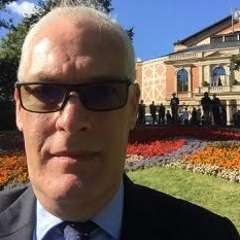'Russian Voices' was introduced by Sholto Kynoch, Artistic Director of the Oxford Lieder Festival, as an evening of romances, mainly cello and songs, as part of King's Place's ongoing Cello Unwrapped series. Ranging from a very early Rachmaninov Romance in F minor to a bleak late song cycle by Shostakovich, the recital explored the depths and layers of sentiment of the Russian mind over a century of upheaval.
After the teenage Rachmaninov, played with lyrical cantabile by cellist Guy Johnston, his line interwove in the second of a set of Six Romances by Arensky, an older colleague of Tchaikovsky. Indeed the tone was not far from Eugene Onegin, with unfulfilled dreams and fleeting love. Bass-baritone Michael Mofidian's sombre-hued voice, with sustained legato and expressive throughout his wide range, although initially stiff of bearing and phrasing, warmed in the later songs, “What is it you dream of” and “At times I have seen”, with their imagery of stars.
Stars also shone in Pauline Viardot's song “The Stars” to verses by the leading Russian poet Afanasy Fet, unacknowledged in the programme. Viardot, member of the Garcia musical family and a distinguished mezzo and salon hostess, was unexpected in this recital, but she spoke fluent Russian and Turgenev was part of her ménage. Joan Rodgers's idiomatic soprano and the surging cello obbligato were revelatory in this symbolist paean.
The first of two works dedicated to Mstislav Rostropovich was Prokofiev's 1950 Cello Sonata in C major , with its darkly brooding first movement given full articulation by Kynoch and Johnston, seemingly looking back to an earlier Romantic era that recalls Rachmaninov, with silvery bells in the piano right-hand. The Scherzo and Trio in Prokofiev's caustic, sarcastic manner, gave some relief after the preceding soulfulness, with its subversive use of the DSCH motif, Shostakovich's musical signature, dancing on the edge in the repressive Stalinist era. The C major finale avoided empty triumphalism, with its wide ranging tonality, brilliantly executed passage work and rhythmic punchiness.
For the second part of the evening the soloists were joined by prize winning violinist Sophie Rosa, playing a 1795 Gagliano. Her satin tone and generous phrasing were well displayed in Rachmaninov's Romance no. 1, its gypsy felt more reminiscent of Budapest than Moscow, and the ever popular Shostakovich Romance from The Gadfly.
After this composer's atypical romance, the evening ended with his late 1967 Seven Romances on Poems by Alexander Blok, ostensibly written to celebrate the 50th anniversay of the 1917 Revolution, but in fact at the request of Rostropovich to be performed by himself and his soprano wife, Galina Vishnevskaya. Blok's eerie symbolist verses, written with chromatically coded images of wars, pestilence and tyranny, exploit uneven rhythms and harsh effects and this led Shostakovich to add parts for violin and piano to give a broader colour range, initially singly and only all coming together in the last song. Joan Rodgers was an intense, almost raw soprano was secure, despite a brief vocal lapse in the second romance, in the cycle's vivid language and emotion. The instrumental soloists sharply characterised the taut, spare rhythms with some repose in the sombre third and fourth songs, with pearling violin and reflective cello. Only in the postlude to the final song, Music an address to “O Lady, Sovereign of the Universe” do the violin and cello blend in harmony, yet with quizzical interjections from the piano.
The recital offered a very Russian journey of the spirit, given range and texture by the two vocal and three instrumental soloists.


